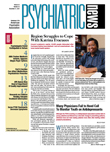It's that time again! You may have already received your ballot by e-mail blast or by paper mail to vote for APA's next leaders in the Association's 2008 election. (By the way, do we have your current e-mail address on file? If not, please see the note at the end of this column.)
APA's election provides an opportunity for each APA member to participate in choosing officers and members of the Board of Trustees. While many other groups such as the AMA endorse indirect elections (in which a smaller group of previously elected individuals meet and choose their leaders), APA believes that direct individual voting provides a unique opportunity for members to shape the directions of the Association.
I came of voting age in the late 1950s, when apathy was the norm. My parents were diametrically opposed politically and often threatened that both could stay home, since they cancelled each other out, but I suspect they never quite trusted the other would not vote. They reminded me that if I didn't vote, I was not contributing and had no right to complain. I have never missed an election, but educating myself about issues and candidates is demanding.
The APA election process consumes considerable time and resources, both for the Association and for the candidates. The cost of paper (mailed) ballots is not inconsiderable, nor is the staff and member labor in support of the process. Candidates, too, expend effort to interact and inform, traveling to district branch and subspecialty meetings and sharing their background and experience, positions, and priorities.
Being a candidate is only the beginning. Serving also demands time and energy. Some years ago, members with salaried positions in academia, hospitals, or community settings could easily make time for APA business, and many used administrative and secretarial support from their institutions; not so for those in private practice. Now, most institutions require that volunteers take leave and provide minimal institutional support, so almost everyone experiences some financial impact. As president-elect, I spent more than 1,900 hours away from the office on APA business (yes, I kept count), and that figure doesn't include countless hours of reading, preparation, conference calls, and similar activities. As president, the figure so far is 800 “away” hours. The time demands have meant cutting my private-practice hours considerably, as well as discontinuing work as an organizational/institutional consultant. Of course the president, president-elect, speaker, and speaker-elect receive some compensation for their major time commitment, but individuals in all of the other positions, including other officers, are not compensated (other than reimbursement for travel expenses according to APA guidelines). Why do we do it? The key is love of our profession and the desire to work for it and for our patients.
Consequently, when fewer than one-third of eligible voting members actually cast a ballot in APA's election, the leadership is deeply concerned. Why don't more APA members exercise that right? What does their silence mean?
Some members view this lack of participation as a reflection of dissatisfaction. They see the glass as half empty and fear that low participation means that APA is not providing value, that there aren't real differences between candidates. A second group is just too busy taking care of patients. Doing the work to make an informed choice does not represent a positive cost benefit to them. Still another group sees the situation in a more positive light. They too are busy, but they trust and are willing to delegate the process to those most involved and active in APA. All of these may be accurate, but may be insufficient. Please write me at
[email protected] to express your thoughts about the election process.
What should we consider when voting? Obviously there are many issues including specific experience, focus, and style.
•
Is this candidate supportive of the goals and principles of our Association and profession?
•
Will this candidate put aside personal issues or views to consider the good of the Association and to carry out its policies?
•
Will this candidate be open and available to the membership?
•
Will this candidate devote the time and energy needed to be an effective leader?
This year's candidates represent a diversity of interests, backgrounds, and affiliations. All are leaders in their communities and profession. Read their biographical and candidacy statements in the December 7 issue of
Psychiatric News or online at<
http://pn.psychiatryonline.org/content/vol42/issue23/> and go to the candidates' Web sites; discuss the issues with colleagues.
Ballots must be received by e-mail or snail mail by 5 p.m. EST on February 5, 2008. Please bring your voice to action and VOTE.
To add or update your e-mail address online, go to Members Corner and click on “Update Your Membership Profile Now” in the Spotlight Section; to do so by phone, call APA's Answer Center at (703) 907-7300. ▪

